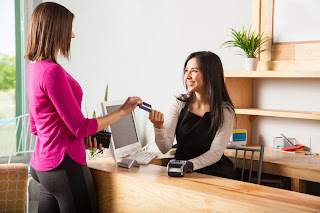the experience of Epos system
The first consideration you should make is what be what kind of system you
want: a countertop or a tablet system.
A countertop would be ideal for someone in the retail sector – a shop where
people are coming up to the counter to pay.
Meanwhile, a tablet system gives you the flexibility to move around the
counter. You can browse products online with the customers or you can take
orders at the table, for example. If you’re a market trader or a food truck,
you simply can’t accommodate a large countertop system.
They’re often cheaper but not quite as robust as a countertop system. For
most small businesses I’d say that the tablet system makes more sense.
In terms of capabilities, you can find a countertop or tablet system which
has more or less the same functionality.
Even if you’re keeping costs down, it doesn’t mean you should skimp on
features. You want to be looking at a POS system which has tools and features
specific to your industry.
For example, restaurants will want to have an EPOS system that has table
management, opening tabs, splitting bills.
After that, you’re looking at whether you want a cloud-based
system. The cost you pay for the monthly software subscription is an extra
charge, but it means it will give you more information such as inventory and
sales records – as that’s kept online and you can access it any time from
your mobile or your computer at home.
Think about integration
as well. What accessories do you want with your POS system? Most businesses
will want a card machine and a receipt printer. Those who choose a countertop
system with a touch screen might also want a keyboard for taking things like
email addresses.
Keeping track of costs
I do think price is a huge consideration for small businesses.
As a rough guide, for a countertop system, you’re looking at around £1,000
to buy outright. The tablet or iPad system will cost you £800-£900.
Most businesses would choose to lease or rent a system.
With the rental, it’s obviously more expensive because you’re not buying the
system outright but the advantage with renting is that if anything goes wrong
in that time, the supplier will take it and fix it free of charge. That can be
a good way of keeping
your overheads down and covering yourself for anything that might go wrong
with the machine further down the line.
A countertop system can be leased for around £50 a month while the lease for
a tablet would work out about £30-£40 a month.
If you can afford the upfront sum, it pays to do that in the long run
because you’re going to end up paying less.
What I would say is that you don’t need a dedicated POS tablet – if you’re a
trader you can download an app and run it on your iPad. There’s nothing special
about these POS tablets.
It’s also important to factor in the cost of the aforementioned accessories
early on. If cost is an issue for you, you don’t want to buy a POS system and
spend an extra £100-£160 on accessories.
You can get a barcode scanner for £60, a rental card machine about £20 a
month (plus fees), on top of that you’re paying your transaction fees and your
merchant account fees.
Your receipt printer is usually part of the package but if it’s not, you’re
looking at between £80 and £120. Most machines will come with a receipt printer
so look out for that when you’re buying too.
“Don’t be pushed to go above what you’re willing to spend because you will
no doubt find an option that is suitable for your business at your chosen price
point”
What about refurbished systems?
Refurbed systems aren’t available through the big players, so you’ll have to
go through an independent trader. You’re probably going to get it for between
half and two-thirds of the original price.
With a countertop system, for example, you’d be paying £1,200 but refurbed
you’d be paying £700-£800. They can be a good option for small businesses.
That said, they won’t come with the same level of support as they would if
you buy or rent from a big name supplier though. There is an inherent risk when
buying a refurb system that it’s outdated or that it breaks further down the
line. But they’re certainly something to consider if you’re looking to keep
your costs down.
Where to get them
I’d recommend going with a reputable supplier because there are good options
out there; they’re not all going to rip you off.
If you’re looking to buy a new system, don’t go to eBay.
You may be able to get a refurb, but again, there’s no guarantee of history, so
you are running a risk by doing that.
Adapting your POS system to your growing business
If you’re a business that’s looking to grow in the next few year, you’ll
have to take into account the scalability of the system.
With iZettle,
you can just keep adding iPads as and when you need. You’ll have one account
within their app and if you need additional points of sale, you can add another
tablet and have access to the same kind of information.
In that respect, cloud-based systems are fantastic and easy to scale.
It means that you’ve got one central reference point and you can just keep
adding POS systems as and when you need them.
Overall, I’d advise looking to a dedicated small business merchant supplier
– they deal with small businesses on a daily basis and they know what their
price points are. Don’t be pushed to go above what you’re willing to spend
because you will no doubt find an option that is suitable for your business at
your chosen price point.
sorce:https://smallbusiness.co.uk/



Comments
Post a Comment